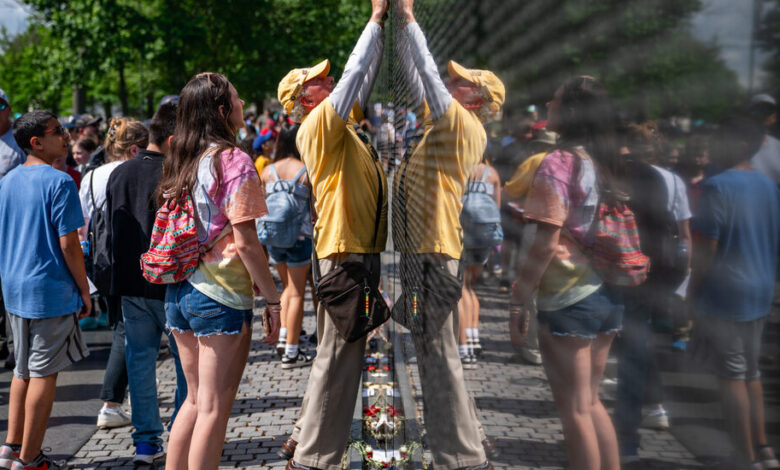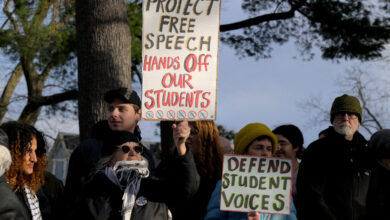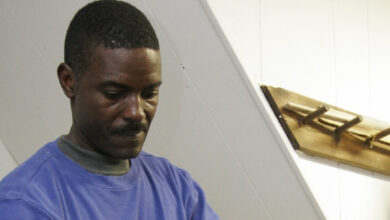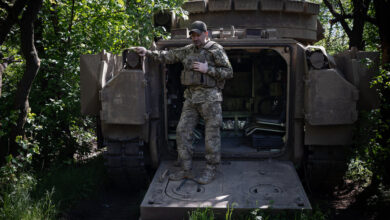At Vietnam War Memorial, Grief, Anger and a Sense of Finally Moving On

They began to arrive when the late-morning sun had risen above the trees, just as the black paving stones at the Vietnam Veterans Memorial had started to get hot. They were teenagers on school trips, and tourists out for a stroll, and veterans of several American wars dressed in matching red T-shirts and red vests to identify them as members of a tour group from California.
As the path grew crowded with hundreds of people, Dan Creed positioned himself at the center of the memorial, a pair of black granite walls inscribed with the names of the dead, across from the Lincoln Memorial in Washington. He is a volunteer with the National Park Service. He is also a veteran of the Vietnam War. His infantry unit in the 101st Airborne lost no soldiers to injury or death during his time as the unit’s leader, a notable achievement in a war that killed 58,220 American soldiers and left many thousands more injured and disabled.
After the war, Mr. Creed got married, had six children and built a successful career as a military contractor. On Wednesday, the 50th anniversary of the war’s end, Mr. Creed found that his thoughts about the war — especially the primary place it once held in his mind — had changed.
“I always thought that was my proudest thing, that nobody got wounded or killed” under his command, said Mr. Creed, 76, who lives in Fairfax, Va. Then his children became happy and successful adults. “And that’s the thing I’m proudest of now,” he said.
For decades, the conflict in Vietnam lay at the heart of America’s discussion about itself, about what it meant for the world’s wealthiest nation to fight and lose a war in which the purpose was never clear, and that viscerally divided a generation. On Wednesday, 50 years after the last U.S. soldiers and embassy staff evacuated Saigon, it seemed the war’s central role in American culture had faded.
Few people, it seemed, came to the memorial to mark the anniversary. Many did not even realize it was an anniversary, arriving on long-planned vacations to find a lovely day in the capital, with fresh green leaves on the trees and azaleas in full bloom. In the crowd, many came to look back on Vietnam and the loved ones they had lost through the eyes of the older people they are: still sad, less angry and happier now to talk about the grief they buried half a century ago.
“I had so much anger and frustration that for years I couldn’t talk about it,” said Dan Moore, 80, a Vietnam veteran who lives in McLean, Va. “A lot of the stuff that tormented me for so long, it has passed.”
When Tim O’Brien wrote “The Things They Carried,” the semi-autobiographical collection of linked stories based on his time as an infantry soldier in Vietnam, he created a character named “Tim O’Brien” who tussled with the same question as the real one: Should he dodge the draft, flee to Canada and live in exile, possibly forever? In the novel as in real life, Mr. O’Brien reached the same conclusion: No. He would go to Vietnam.
The book was published in 1990, to great critical acclaim. In the 35 years since, Mr. O’Brien has come to believe more strongly that he made the wrong decision.
“I shouldn’t have gone,” Mr. O’Brien, 78, said in an interview this week. “I knew that when I was younger. But now it’s really clear.”
Tran Van Ly never questioned his role in the war. Among the T-shirts, gym shorts and sleeveless leather jackets worn by tourists and veterans to the Vietnam memorial on Wednesday, Mr. Ly stood out for his formal dress: a tan military uniform, bedecked with bronze medals and red epaulets and topped by a black beret cocked to the right.
Little has changed for Mr. Ly, a former officer in the South Vietnamese Army who lives in Virginia. He still hates communism, he said. He has never returned to Vietnam after escaping the country in a small boat in 1991, and he never will.
Recently his feelings have softened, however, if only a little. His family members back home are enjoying more prosperity, he said, and more opportunity to speak their minds.
“I thought it would never change,” he said of Vietnam’s government. “Now my country, it has changed for the better. I feel more hope now.”
Carolyn Watson’s father was killed in Vietnam on Aug. 7, 1969. Ms. Watson was 10. Fifty-six years later, Ms. Watson visited the memorial for the first time. She pressed her fingers to her father’s name, Milford Marvin Tognazzi, inscribed in stone. Her cheeks grew wet with tears. After her father died, money from the federal government helped to support her mother, who died two years ago of natural causes.
Ms. Watson’s sadness is an old sadness. Her gratitude is new.
“The sad side is I lost my daddy,” said Ms. Watson, who lives in Creston, Calif. “If there’s any good in it, it’s that my mom was taken care of her whole life.”
The first group of high school students left. Another arrived. In front of the walls of names, the stone path grew crowded. Standing in the crowd, Mr. Moore knew the exact location of at least one name, Kenneth E. Stetson.
In the middle of January 1968, Lieutenant Moore relinquished command of his artillery unit to Lance Corporal Stetson, his friend and assistant, and was assigned as an artillery liaison officer with the Second Battalion, Fifth Marines. Two weeks later, North Vietnamese forces began the Tet offensive, a surprise attack that marked a major escalation in the war.
Mr. Moore remembers the date he next saw his assistant: Feb. 17, 1968. He noticed an injured soldier lying in front of a bombed-out building in the city of Hue. He walked over and recognized the wounded man as his friend. He had been shot in the upper abdomen.
“Stetson, what happened?” Mr. Moore said.
“Lieutenant, I’ve been shot,” Mr. Stetson replied. He was evacuated to a hospital, where he died.
Mr. Moore continued fighting. After the military, he became an intelligence officer with the C.I.A. For decades, he focused on the work. He tried to read books about Vietnam, and to write a memoir. He failed. He found himself incapable of even thinking about the war.
“I was angry about how futile the whole thing was,” Mr. Moore said, “and how so many people I knew died there.”
After he retired, during the Covid pandemic, Mr. Moore sat down again to write. He addressed his final, brief interaction with Mr. Stetson. A new, happier narrative formed.
“It was providence,” Mr. Moore said. “God allowed me to see him before he died, and I was able to give him some comfort.”
Fifty-seven years, two months and eight days later, Mr. Moore finds he no longer dwells on the chaos or the sadness or the anger or the fear.
“I’m sort of at peace,” he said.




